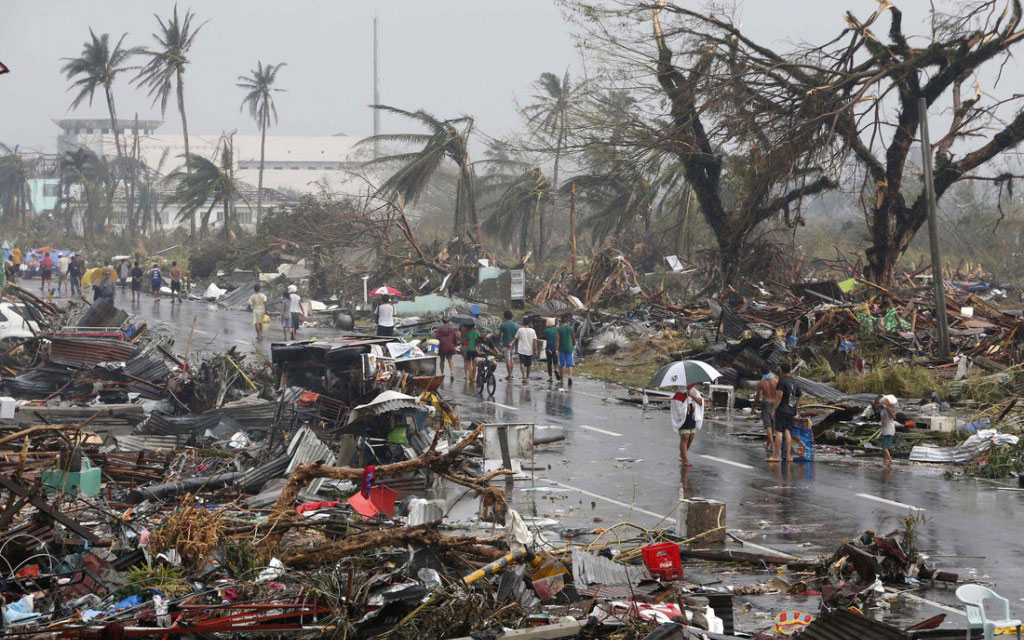When is a “looter” really just a survivor?
 Typhoon survivors in Tacloban city, on the island of Leyte, Philippines. Photo by Erik de Castro/Reuters
Typhoon survivors in Tacloban city, on the island of Leyte, Philippines. Photo by Erik de Castro/Reuters
Whenever there is a major disaster we are always confronted in the media by stories about “looting.”
When I see these stories, I always try to imagine myself surviving an emergency like the typhoon that hit the Philippines on Friday, and wonder what I would do in the following days. Would I go out and scavenge some food, water, and first-aid for my hungry, dehydrated, injured family? Probably.
Is that looting? I worry about labeling people struggling to survive as looters because it might be seen by some as an excuse to turn our backs on them, as if they don’t deserve our help.
Ethics of survival
A colleague pointed me to Rebecca Solnit’s book A Paradise Built in Hell about how communities recover from disasters. Solnit believes that we should ban references to “looting” from the English language because it portrays people just trying to survive as criminals.
“The great majority of what happens you could call emergency requisitioning,” she writes. “Someone, who could be you… takes necessary supplies to sustain human life in the absence of any alternative. Not only would I not call that looting, I wouldn’t even call that theft.”
Neither would St. Thomas Aquinas, who was way ahead of most of us on this debate (he was born in 1225). He wrote in his Summa Theoligica Part II that “…if the need be so manifest and urgent, that it is evident that the present need be remedied by whatever means be at hand (for instance when a person is in some imminent danger, and there is no other possible remedy), then it is lawful for a man to succor his need by means of another’s property, by taking it either openly or secretly, nor is this properly speaking theft or robbery.” (Summa Theoligica Part II, Seventh Article, Whether it is Lawful to Steal Through Stress of Need.)
So, maybe survival is one thing and outright theft of some valuable non-food item like a nice high-def flat-screen television is looting. I suppose some people in chaotic situations find it easy to slide down a slippery slope, talking themselves into taking things they obviously should not: The police officer fighting off dehydration and snagging a bottle of water from a store in the middle of a 10-hour gun battle with Al-Qaeda-linked terrorists in a mall in Nairobi is probably not breaking any social norms in a serious way, but his colleagues who somehow convince themselves that they can clean out a jewelry store certainly were. Perhaps disaster survivors are just as vulnerable to this thought process. Anyone reading this have any direct experience in post-disaster coping they would like to share?
There is going to be crime and looting when the social order breaks down, so the media reports on them.
A mob besieged a warehouse on Tuesday in Alangalang, Leyte, taking away 33,000 bags of rice – and a wall collapsed, killing eight people. Aid organizations in the Philippines are also concerned about reports of armed people trying to hijack aid shipments.
The journalists stuck at the airport on Tacloban are obviously frustrated about the suffering they are witnessing and the initial slow pace of the response as they cover the chaotic scene and exhort the government to re-establish security.
But some of them are also being realistic, so you have to give them credit. Several CNN reporters speaking to Anderson Cooper on his program “360” Tuesday night discussed the struggle to survive at the end of the program.
Andrew Stevens, who has been in Tacloban since before the storm hit, said “Looting is a bit of a [moot] point for people trying to stay alive.”